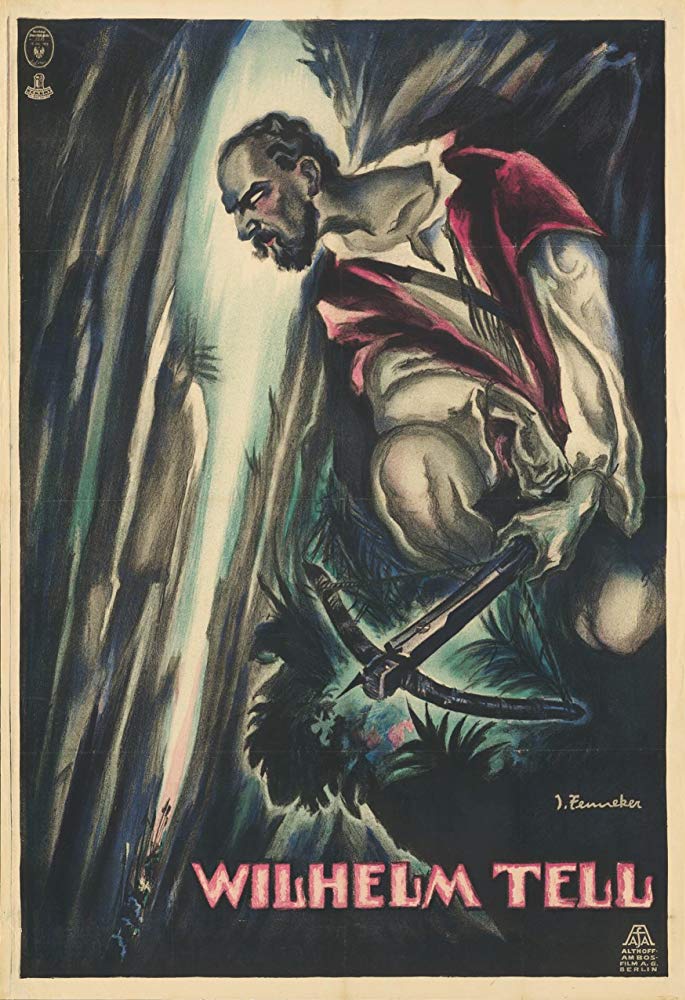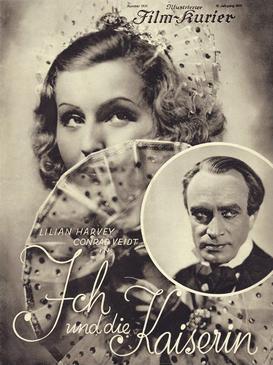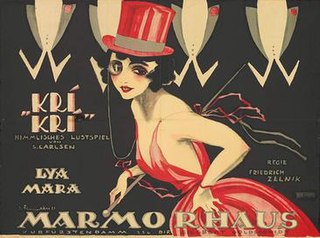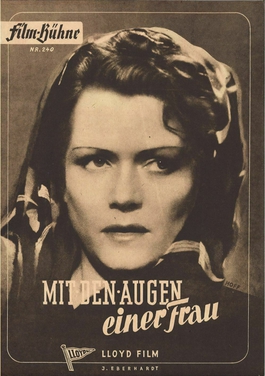Related Research Articles

Rasputin, Demon with Women is a 1932 German drama film directed by Adolf Trotz and starring Conrad Veidt, Paul Otto and Hermine Sterler. It was shot at the Halensee Studios and Terra Studios in Berlin. The film's sets were designed by the art directors Gustav A. Knauer and Walter Reimann. It portrays the influence wielded by Grigori Rasputin over the Russian Royal Family around the time of the First World War. It was released the same year as an American film about him Rasputin and the Empress. Felix Yusupov sued the filmmakers for his portrayal, but ultimately dropped his case. The film was banned in Germany in 1933 following the Nazi Party's rise to power.

William Tell is a 1923 German silent adventure film directed by Rudolf Dworsky and Rudolf Walther-Fein and starring Hans Marr, Conrad Veidt, and Erich Kaiser-Titz. The film portrays the story of the legendary Swiss national hero William Tell. The sets were designed by Rudi Feld. It premiered at the Marmorhaus in Berlin.

William Tell is a 1934 German-Swiss historical drama film directed by Heinz Paul and starring Hans Marr, Conrad Veidt and Emmy Göring. It is based on the 1804 play William Tell by Friedrich Schiller about the Swiss folk hero William Tell. It was made in Germany by Terra Film, with a separate English-language version supervised by Manning Haynes also being released. It was shot at the Marienfelde Studios of Terra Film in Berlin with location shooting in Switzerland. While working on the film Veidt, who had recently given sympathetic performances of Jews in Jew Suss (1934) and The Wandering Jew, was detained by the authorities. It was only after pressure from the British Foreign Office that he was eventually released. It is also known by the alternative title The Legend of William Tell.

Land Without Women is a 1929 German drama film directed by Carmine Gallone and starring Conrad Veidt, Elga Brink and Clifford McLaglen. It was based on the novel Die Braut Nr. 68 by Peter Bolt. The film is set amongst a community of gold diggers in Western Australia. It was shot at the Staaken and Templehof Studios in Berlin with sets designed by the art directors Hans Sohnle and Otto Erdmann. It was made by the small independent production company Felsom Film as a Part-talkie film, the first German-speaking sound film to be released. It was followed a month later by the first all-taking film Atlantik, which had been made in Britain.

Passion is a 1925 German silent drama film directed by Richard Eichberg and starring Otto Gebühr, Lilian Harvey and Camilla von Hollay. Harvey was by this time a rising star, and followed it with her breakthrough film Love and Trumpets released the same year.

The Last Company is a 1930 German war film directed by Curtis Bernhardt and starring Conrad Veidt, Karin Evans and Erwin Kalser. It was part of the popular cycle of Prussian films which portrayed patriotic scenes from Prussian history. It was shot at the Babelsberg Studios of UFA in Berlin. The film's art direction was overseen by Andrej Andrejew who designed the film's sets. It was shot on location around Havelland in Brandenburg. It is also known by the alternative title Thirteen Men and a Girl. It was later remade in 1967 as A Handful of Heroes.
The Flight in the Night is a 1926 German silent film directed by Amleto Palermi and starring Conrad Veidt, Robert Scholz and Angelo Ferrari. It was based on the play Henry IV by Luigi Pirandello. The art direction was by Hermann Warm. It was shot on location in Italy.

Love Is Blind is a 1925 German silent comedy film directed by Lothar Mendes and starring Lil Dagover, Conrad Veidt and Lillian Hall-Davis. It was shot at the Babelsberg Studios in Berlin. The film's sets were designed by Hans Jacoby. It was produced and distributed by UFA, Germany's largest film company of the Weimar Era.

The Empress and I is a 1933 German musical comedy film directed by Friedrich Hollaender and starring Lilian Harvey, Mady Christians and Conrad Veidt. It is also known by the alternative title of The Only Girl. The film was produced as a multi-language version. Moi et l'impératrice a separate French-language version was released as well as The Only Girl in English. The multilingual Harvey played the same role in all three films.

They Call It Love is a 1953 West German comedy film directed by John Reinhardt and starring Winnie Markus, Curd Jürgens and Richard Häussler. It was shot at the Bavaria Studios in Munich. The film's sets were designed by the art director Ludwig Reiber.
Temperamental Artist is a 1920 German silent film directed by Paul Otto and starring Conrad Veidt, Aud Egede-Nissen, and Frida Richard.

The First Right of the Child is a 1932 German drama film directed by Fritz Wendhausen and starring Hertha Thiele, Eduard Wesener and Helene Fehdmer.
The Japanese Woman is a 1919 German silent mystery film directed by Ewald André Dupont and starring Max Landa, Manja Tzatschewa and Conrad Veidt.

The Path of Death is a 1917 German silent drama film directed by Robert Reinert and starring Maria Carmi, Carl de Vogt and Conrad Veidt. It marked the screen debut of Veidt. The film was shot in late 1916, but released the following year. It is a lost film.
The Mexican is a 1918 German silent film directed by Carl Heinz Wolff and starring Ferdinand Bonn and Conrad Veidt. It is a lost film.
The Clan is a 1920 German silent drama film directed by Carl Wilhelm and starring Ressel Orla, Johannes Riemann and Conrad Veidt.
The Heiress of the Count of Monte Cristo is a 1919 German silent film directed by Frederic Zelnik and starring Lya Mara, Werner Funck, and Vilma von Mayburg.

Kri-Kri, the Duchess of Tarabac is a 1920 German silent comedy film directed by Frederic Zelnik and starring Lya Mara, Johannes Riemann, and Gisela Werbisek. It premiered at the Marmorhaus in Berlin.

With the Eyes of a Woman is a 1942 German drama film directed by Karl Georg Külb and starring Ada Tschechowa, Olga Tschechowa and Gustav Fröhlich.

Helene Willfüer, Student of Chemistry is a 1930 German silent drama film directed by Fred Sauer and starring Olga Tschechowa, Ernst Stahl-Nachbaur and Elza Temary. It is based on the 1928 novel of the same title by Vicki Baum, which was subsequently remade as the 1936 French film Hélène and the 1956 West German film Studentin Helene Willfüer. The film's sets were designed by the art director Max Heilbronner. Location shooting took place around Heidelberg.
References
- ↑ Bock & Bergfelder p.497